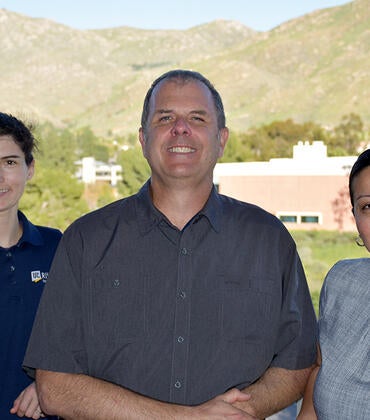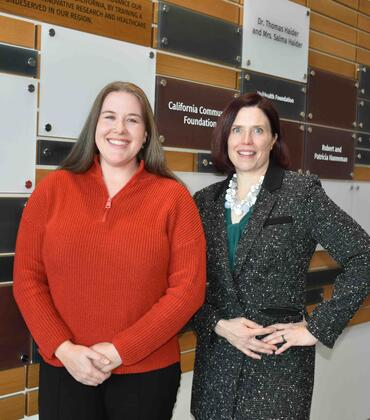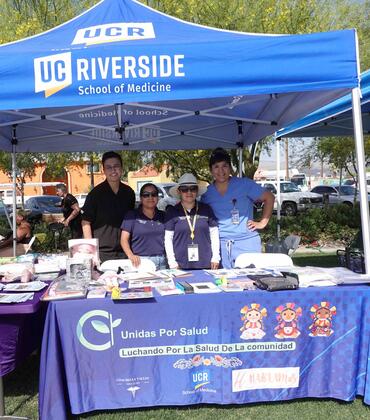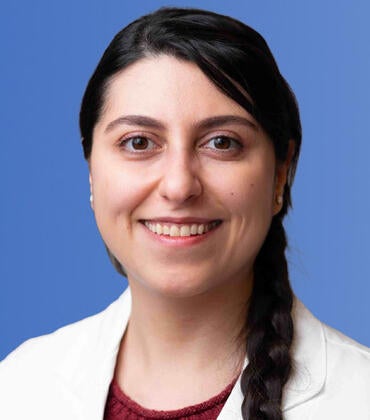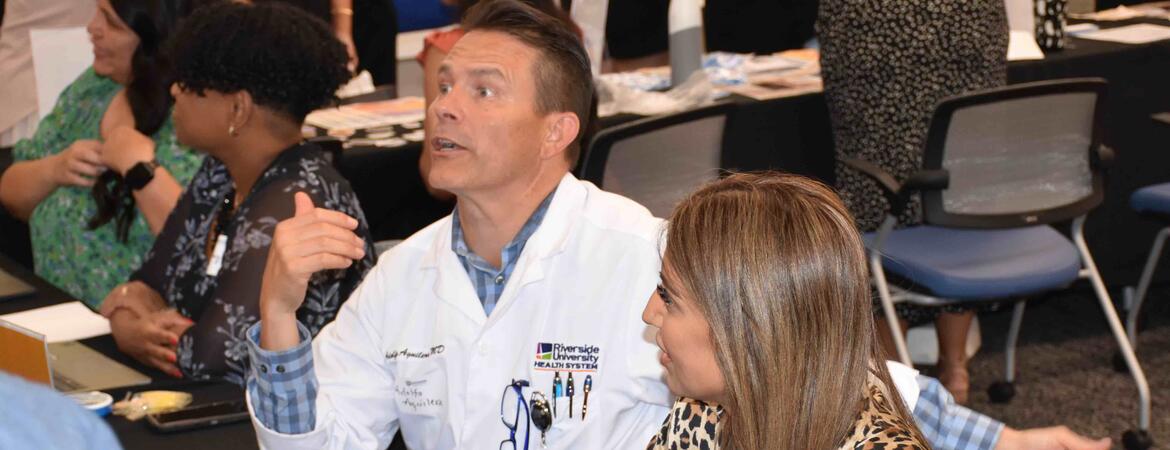
During an appointment several years ago, a longtime patient and Mexican immigrant told Adolfo Aguilera, MD, that she had recently become an American citizen but was unsure whether she wanted to vote. “I told her it's important to vote, that this is part of being a citizen of the United States so that your voice is heard and your voice is counted when decisions are being made,” said Aguilera, a physician at Riverside University Health System (RUHS) and director of clinical skills at the UC Riverside School of Medicine.
“Randomly one day a year later, when I entered the room, her eyes were glowing…and she's like, ‘You wouldn't believe what I did,’” he recalled. “She said, ‘I went out and I voted because of what you showed me about the importance of my voice,’” explaining that his words empowered her. It didn’t matter how she voted, Aguilera added, but that he served as a positive role model and was able to pay forward his own experiences from growing up.
“You’re going to become a doctor”
Aguilera’s own family immigrated from Mexico to the San Fernando Valley when he was just a few years old. He soon began helping his parents by translating for them at medical appointments. While he wanted to help other families facing similar challenges, including the alcohol addiction that his father experienced, he didn’t know any doctors himself. “My vision was to be a role model, because I didn't have one,” he said.
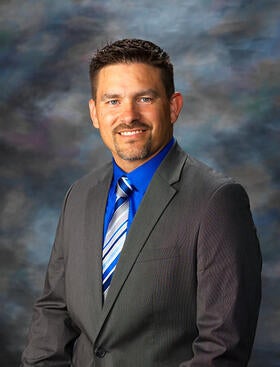
Although Aguilera lacked role models for a career, he had a positive influence in his parents’ hard work and in his older siblings. One day when Aguilera was six years old, his older sister Victoria and brother Bernardino sat their younger siblings down and asked what they wanted to be when they grew up. When they said they didn’t know, “She was like, ‘Okay, well, you're going to become a doctor, you're going to become a lawyer, you're going to become a teacher, and you're going to become an engineer,’” Aguilera said. “I ran with it,” he added with a laugh, as the one chosen to be a doctor. “That was the spark, but I needed that spark to have the confidence to move forward, and my sister and my older brother gave me that.”
Finding that he enjoyed science and biology, Aguilera eventually attended medical school in Illinois, following his sister’s career selection as the rest of his siblings followed their own assigned paths to become engineers, teachers, and even CEO of the National Hispanic Caucus Institute. Upon graduating, Aguilera matched into a family medicine residency program in Riverside that would eventually become RUHS.
Aguilera planned to return to give back to his home community in Los Angeles until his residency program director offered him a faculty position in Riverside. “I never thought to stay here in the Inland Empire, although now reflecting back, it was the best decision that I made in my professional career,” he said. “One of my professional goals was always to work with underserved communities… and I wanted to be there to help those people in Riverside County.”
Fulfilling UCR’s mission, and his own
A few years later, in 2002, Aguilera began working with UCR as well. As there was no four-year medical school at the time, UCR medical students completed their degree at UCLA through the UCR/UCLA Thomas Haider Program in Biomedical Sciences. UCR was already focused on opening its own medical school, though, and Aguilera contributed as part of a committee to help develop the new school’s mission.
“I was aligned with what they were trying to do… to be an institution that was going to serve as a platform for training students to go into primary care fields to help bridge the gap of the shortage of primary care physicians,” he said. This remains a particular issue in the Inland Empire, which had the lowest number of primary care physicians per 100,000 people in 2020 than any other region in California. “In addition, it was to train medical students to be able to stick around this area and work in underserved areas with vulnerable populations, and that's near and dear to my heart,” he said.
The UCR SOM’s mission, “to improve the health of the people of California and, especially, to serve Inland Southern California by training a diverse workforce of physicians,” reflects these values. Aguilera has watched the school fulfill it over time, evident in the diversity of the students. “Students know the mission, and if we get those like-minded students and serve that pipeline to feed them through our residency program that has similar goals as UCR, then it's a win-win situation for the area,” he said.
Since 2008, Aguilera has served as clinical skills director and as a member of the admissions committee since 2010, on top of his ongoing work as a practicing physician and residency associate director at RUHS.
In his clinical skills role, Aguilera teaches students bedside manner, techniques for examining patients, and cultural awareness. “Clinical skills is about exposing students to scenarios that make them challenge their own biases and thought processes, and hopefully keep an open mind whenever they're encountering any patient, irrespective of their background, religion, or socioeconomic status,” he explained. “In addition, we teach them… to use communication for connection to make that patient feel valued, to make them feel heard, and to give them an experience that is fulfilling and meeting their needs,” he added–exactly the qualities lacking in the doctors Aguilera translated for as a child, and important to instill in others as part of his own mission as a physician.
John Milo Dover, MD, a former SOM student and now a social medicine fellow with the HEAL Program at RUHS where he works with Aguilera, said Aguilera always treats patients equitably and encourages his students. “He cares about people outside of simply their work, and he cares about patients outside of their illnesses,” Dover said.
Dover added that Aguilera is never too busy to share his knowledge. “He is always willing to talk about his thought processes and everything about what decisions he is making, and I think that's something that's incredibly important,” he said.
Aguilera also fulfills his personal mission through his role on the SOM admissions committee, where he helps select future medical students who are aligned with the SOM’s commitment to the Inland Empire. He said he appreciates the SOM’s holistic approach to admissions, which helps them prioritize well-rounded individuals who will build on the school’s mission. “I want to find individuals who want to stay here, so that they can continue the work that we've done and we don't have a shortage,” he said. “Also, individuals who are going to place that importance on the social determinants of health, the connectedness with the patient, the importance of community outreach, so that the care that we give is not just confined within the four walls of that exam room, but goes beyond that.”
Empowering the next generation of physicians
Serving as a role model and giving back to the community remain important values for Aguilera. He has worked with students in pipeline programs and given motivational talks at high schools, including as a commencement keynote speaker. “Those are all important things to me, because there are messages that I want to instill in people and influence them so that they're able to feel empowered,” he said.
He also connects with SOM students when he shares his personal story in a session on professional identity soon after they enter medical school. “Watching the attention that the students are giving, you can tell that they're really embracing what he is saying and doing and really beginning to think about their own identities as physicians,” said Khiet D. Ngo, DO, MS, associate dean of clinical skills education and innovation at the SOM. “I think beyond his contributions in terms of teaching, just role modeling on a daily basis for students of just simply who he is, that sends an incredibly powerful message to all of our students.”
Working with students and seeing their success is one of Aguilera’s primary motivations. “They are the ones that bring those glowing eyes, those aha moments, and I feel like, ‘Wow, I was part of that,’” he said. Sometimes he encounters students he taught in medical school now in their residency at RUHS. “They say, ‘I remember you were there and you taught me my first techniques and skills in how to approach a patient, and I still use the things that you taught in my practice today,’” he said.
“I feel gratitude from seeing that I'm paying it forward to individuals so that they're able to continue that,” Aguilera added. His efforts earned him the lifetime achievement award in education at UCR in 2023-2024.
While Aguilera must prioritize his many roles, with those of husband and father coming first, he plans to continue his work with UCR for both the students and the local community. “It's about impacting people's lives, and that's what my main motto has been: to give back, give it all you've got, and don't give up no matter the obstacles that you face,” he said. “That’s near and dear to my heart because I lived through it, and I know the struggles that people go through.”
